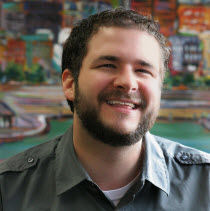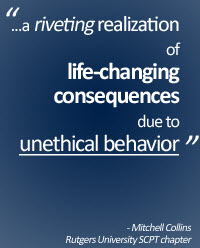|
Author: Andy Goldstein, NASBA Electronic Media Specialist and Webmaster
The CPT began to gain momentum, but Costello came to the realization that he was missing an important resource in his pursuit to promote ethical practices. He thought there would be some intrinsic value in teaching ethics in leadership at the student level; to promote ethical thinking in the developing character and conscience of students. Consequently, CPT launched the Student Center for the Public Trust (Student CPT) program in 2008, with the purpose of teaching college students that ethics matters, and about the importance of considering the ethical implications of their decisions as they venture out into the workplace. "We try to offer them advice and discussion on real life, the real world of business. Things they're not encountering at the student level," said Amy Walters, NASBA CPT Manager of Programs. The mission of the Student CPT is carried out through student chapters on university and college campuses across the nation. There are currently six student chapters, four of which launched in the past five months. The first Student CPT chapter was started at Lipscomb University in Nashville, Tenn., and future chapters are currently forming in New York, South Carolina and Ohio.
"What he has conveyed in the lectures is that the conduct can't be tolerated, and isn't tolerated," said Bauer's attorney Michael Bachner, in an interview after Bauer's hearing. "The consequences of this type of behavior can be enormous, both emotionally and in the criminal justice system." Mitchell Collins, Secretary of the Rutgers Student CPT chapter, said students who attended the lecture referred to it as a riveting realization of life-changing consequences due to unethical behavior. Aside from focusing on ethical leadership in business, the chapters also give back to their communities by participating in civic involvement activities, such as volunteering in soup kitchens or building houses with Habitat for Humanity. Members of the Rutgers Student CPT chapter have also served as speakers themselves at public schools in Newark, N.J., reaching out to inner-city youth on the importance of leadership and ethical decision-making. "It is an honor to be a part of an amazing organization that has made such an impact on me, while allowing me to pay it forward," said Collins in a recent Student CPT essay. Student CPT offers tremendous benefits to its members. Among them is the annual "Ethics in Action" national video competition, where students are encouraged to create a short film or PSA focusing on ethical behavior in the business world. The winner can receive up to $1,000. Winning videos can be viewed on CPT's YouTube channel (after April 10, 2012). Members of Student CPT also have the opportunity to attend CPT's annual Student Leadership Conference, held in coordination with NASBA's Eastern Regional Meeting. Attendance for this year's conference is expected to grow significantly from last year. Not only do Student CPT members gain leadership development and professional skills at this unique meeting, but they also have the opportunity to interact and network with NASBA members attending NASBA's Regional meeting. Walters said she thinks Student CPT membership is not only critical to a student's education, but a tremendous addition to a resume, as well. "Just seeing that there are students out there who are intelligent and ambitious and actually seeking to build a strong ethical foundation has changed my perspective," said Walters. "The Student CPT shows that students are not only interested, but actively seeking to have a strong ethical foundation. What employer wouldn't like to see that? What client of an accountant wouldn't like to see that?" Student CPT is open to all college students (of any major) interested in ethics. For more information on Student CPT, how to donate to this worthy cause or starting a student chapter, please visit the Student CPT website. |

 Several years ago, scandals involving entities like AIG, Fannie Mae and Enron led the accounting profession to develop what seemed to be an irrevocable negative connotation in the media. In an effort to heal the profession's image, former NASBA President and CEO David Costello, CPA, created the NASBA Center for the Public Trust (CPT) in 2004 to focus on the great majority of businesses, corporations and individuals who act in an ethical manner.
Several years ago, scandals involving entities like AIG, Fannie Mae and Enron led the accounting profession to develop what seemed to be an irrevocable negative connotation in the media. In an effort to heal the profession's image, former NASBA President and CEO David Costello, CPA, created the NASBA Center for the Public Trust (CPT) in 2004 to focus on the great majority of businesses, corporations and individuals who act in an ethical manner.